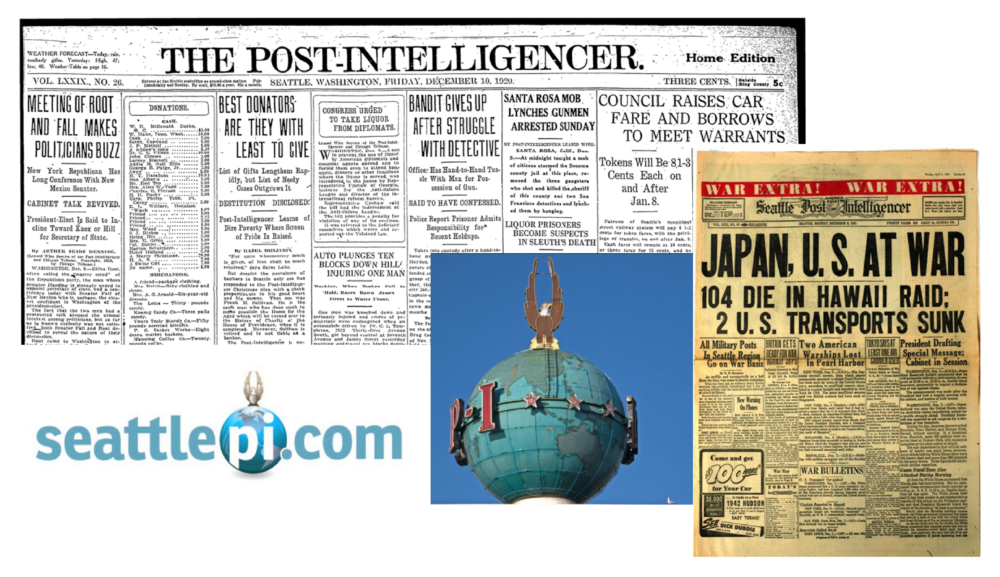
Seattle’s oldest and longest-running newspaper is now available to the public on the Library’s website at spl.org.
The Library used Foundation support to secure the archives of The Seattle Post-Intelligencer, which can now be explored via the Library’s website.
The Seattle Post-Intelligencer, which started as “The Seattle Gazette” in 1863, printed weekly – and then daily – until 2009, when it became the online-only publication it remains today. While the Library has offered access to The Seattle Times since 2010 with Foundation support, the P-I now provides an alternate perspective of life in Seattle.
“This is a game-changer for our community’s and staff’s ability to more fully research local history, whether for deep academic research, family history, casual inquiry, student papers, or anything in between,” said Andrew Harbison, the Library’s assistant director for Collections and Access. “From family wedding announcements, to obituaries, to photos and stories of historic news events, patrons can explore our region’s stories with greater breadth and depth on their own, or with the assistance with our staff.”
Prior to this acquisition, anyone hoping to dive into the Seattle P-I’s records (even present-day P-I reporters) had to sort through microfiche at the University of Washington’s Suzzallo Library and the Museum of History and Industry stacks – a barrier of time, travel, and effort for many.
The Library bought the archives dating from 1901 to 1935 and obtained the license to offer everything published afterward through NewsBank, with the intent of eventually buying the remainder of the archive over time. The difference to the user is negligible.
Content before 1901 is available through the Chronicling America: Historic American Newspapers project jointly sponsored by the National Endowment for the Humanities and the Library of Congress.
The P-I began when Seattle settler Henry Yesler invited J.R. Watson to move to Seattle from Olympia and begin a newspaper.
“It is neither so large as a barn door nor the London Times; but it is the best we can offer for a beginning and is, we trust, sufficient for the time and place,” Watson wrote in the first edition’s message to readers, published Dec. 10, 1863.
Though both the Times and P-I shifted in perspective over time, the P-I grew to be known as the more liberal competitor to the Times’ traditionally conservative editorial bent.
David Wright, reader services librarian, is excited the Library can now offer access to the P-I, not least because his father, Walter Wright, was an investigative reporter for the paper during the 1970s.
“I have zero doubt that this is going to become one of our most-cited and used resources,” he says. “The kind of granularity and personality and depth it gives to all kinds of local stories is massive.”
He continues to peruse the archives himself to send his dad – now living in Hawaii – his old stories.
Susanna Ryan, library staff member and author of “Seattle Walk Report: And Illustrated Walking Tour Through 23 Seattle Neighborhoods,” says that adding the P-I perspective to the Library’s archives is “a major win” for historians, students, and anyone exploring an aspect of Seattle’s past.
Additionally, the archive is easy to navigate.
“Without digital access, you more or less have to know exactly what you were looking for–a certain article, on a certain page, in a certain issue. Just finding that information can be a challenge on its own!” Ryan says. “(Now), whether you’re searching for the name of a family member for genealogy research, the address of a property you’re curious about, or information about an event from Seattle’s past, you need only put the search term in and see what happens.”
John LaMont, genealogy librarian, appreciates the value this paper adds to genealogy research. It increases his chances of helping a patron find something they knew was in some kind of local paper without knowing which one – not just articles and photos, but obituaries, wedding and birth announcements, and funeral notices.
“I can tell you that just about any question we get related to individuals, businesses, or events in Seattle history, we’re using this database alongside The Seattle Times to find the answer,” LaMont says. “The two papers were different, each with their own emphasis and interpretation of events.”
Explore the archive for yourself right here.
The Foundation expresses its gratitude to The Huge and Jane Ferguson Foundation, as well as other supporters of the Library’s Special Collections program, for making this gift to the Library possible.

